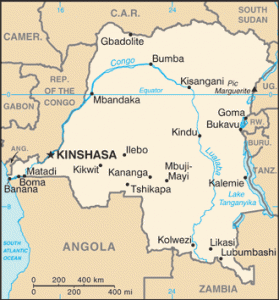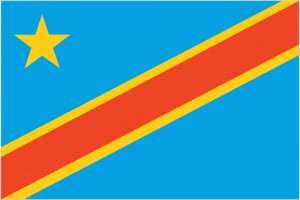Democratic Republic of Congo
 Aglow Leader: Gertrude B. Ekoko
Aglow Leader: Gertrude B. Ekoko
National Board President
Capital: Kinshasa
Pray:
- Pray for peace in the Democratic Republic of Congo, especially in the east where there has been war since 1997.
- Pray for pastors of integrity who preach the truth.
- Pray for strong marriages. Pray for those who are hurt by broken marriages and divided families. Pray that God will heal the wounds and restore relationships.
- Pray for Aglow leaders in the Democratic Republic of Congo as they try to strengthen the groups in the east that are difficult to reach.
Proclaim:
- We proclaim transformation in the Democratic Republic of Congo as God has said. We proclaim the transformation of many nations as the gospel goes out form the DRC for the glory of God. May the DRC abound in goodness, grace and the favor of God.
Interesting Facts About the Democratic Republic of Congo
 Background: The Kingdom of Kongo ruled the area around the mouth of the Congo River from the 14th to 19th centuries. To the center and east, the Kingdoms of Luba and Lunda ruled from the 16th and 17th centuries to the 19th century. in the 1870s, European exploration of the Congo Basin, sponsored by King Leopold II of Belgium, eventually allowed the ruler to acquire rights to the Congo territory and to make it his private property under the name of the Congo Free State. During the Free State, the king’s colonial military forced the local population to produce rubber. From 1885 to 1908, millions of Congolese people died as a result of disease and exploitation. International condemnation finally forced Leopold to cede the land to Belgium, creating the Belgian Congo.
Background: The Kingdom of Kongo ruled the area around the mouth of the Congo River from the 14th to 19th centuries. To the center and east, the Kingdoms of Luba and Lunda ruled from the 16th and 17th centuries to the 19th century. in the 1870s, European exploration of the Congo Basin, sponsored by King Leopold II of Belgium, eventually allowed the ruler to acquire rights to the Congo territory and to make it his private property under the name of the Congo Free State. During the Free State, the king’s colonial military forced the local population to produce rubber. From 1885 to 1908, millions of Congolese people died as a result of disease and exploitation. International condemnation finally forced Leopold to cede the land to Belgium, creating the Belgian Congo.
The Republic of the Congo gained its independence from Belgium in 1960, but its early years were marred by political and social instability. Col. Joseph MOBUTU seized power and declared himself president in a November 1965 coup. He subsequently changed his name – to MOBUTU Sese Seko – as well as that of the country – to Zaire. MOBUTU retained his position for 32 years through several sham elections, as well as through brutal force. Ethnic strife and civil war, touched off by a massive inflow of refugees in 1994 from conflict in Rwanda and Burundi, led in May 1997 to the toppling of the MOBUTU regime by a rebellion backed by Rwanda and Uganda and fronted by Laurent KABILA. KABILA renamed the country the Democratic Republic of the Congo (DRC), but in August 1998 his regime was itself challenged by a second insurrection again backed by Rwanda and Uganda. Troops from Angola, Chad, Namibia, Sudan, and Zimbabwe intervened to support KABILA’s regime. In January 2001, KABILA was assassinated and his son, Joseph KABILA, was named head of state. In October 2002, the new president was successful in negotiating the withdrawal of Rwandan forces occupying the eastern DRC; two months later, the Pretoria Accord was signed by all remaining warring parties to end the fighting and establish a government of national unity. Presidential, National Assembly, and provincial legislatures took place in 2006, with Joseph KABILA elected to office.
National elections were held in November 2011 and disputed results allowed Joseph KABILA to be reelected to the presidency. While the DRC constitution barred President KABILA from running for a third term, the DRC Government delayed national elections originally slated for November 2016, to 30 December 2018. This failure to hold elections as scheduled fueled significant civil and political unrest, with sporadic street protests by KABILA’s opponents and exacerbation of tensions in the tumultuous eastern DRC regions. Presidential, legislative, and provincial elections were held in late December 2018 and early 2019 across most of the country. The DRC Government canceled presidential elections in the cities of Beni and Butembo (citing concerns over an ongoing Ebola outbreak in the region) as well as Yumbi (which had recently experienced heavy violence).
Opposition candidate Felix TSHISEKEDI was announced the election winner on 10 January 2019 and inaugurated two weeks later. This was the first transfer of power to an opposition candidate without significant violence or a coup since the DRC’s independence.
The DRC, particularly in the East, continues to experience violence perpetrated by more than 100 armed groups active in the region, including the Allied Democratic Forces (ADF), the Democratic Forces for the Liberation of Rwanda (FDLR), and assorted Mai Mai militias. The UN Organization Stabilization Mission in the DRC (MONUSCO) has operated in the region since 1999 and is the largest and most expensive UN peacekeeping mission in the world.
Government Type: semi-presidential republic
Population: 105,044,646 (July 2021 est.)
Ethnic Groups: more than 200 African ethnic groups of which the majority are Bantu; the four largest tribes – Mongo, Luba, Kongo (all Bantu), and the Mangbetu-Azande (Hamitic) – make up about 45% of the population
Languages: French (official), Lingala (a lingua franca trade language), Kingwana (a dialect of Kiswahili or Swahili), Kikongo, Tshiluba
Religions: Roman Catholic 29.9%, Protestant 26.7%, Kimbanguist 2.8%, other Christian 36.5%, Muslim 1.3%, other (includes syncretic sects and indigenous beliefs) 1.2%, none 1.3%, unspecified .2% (2014 est.)
Interesting Facts information from the cia.gov website. Read more about DRoC
